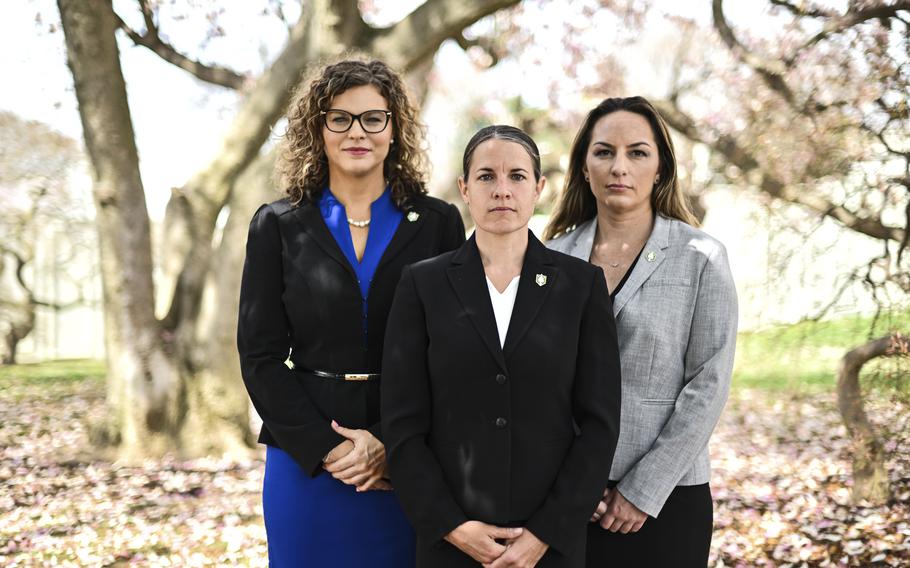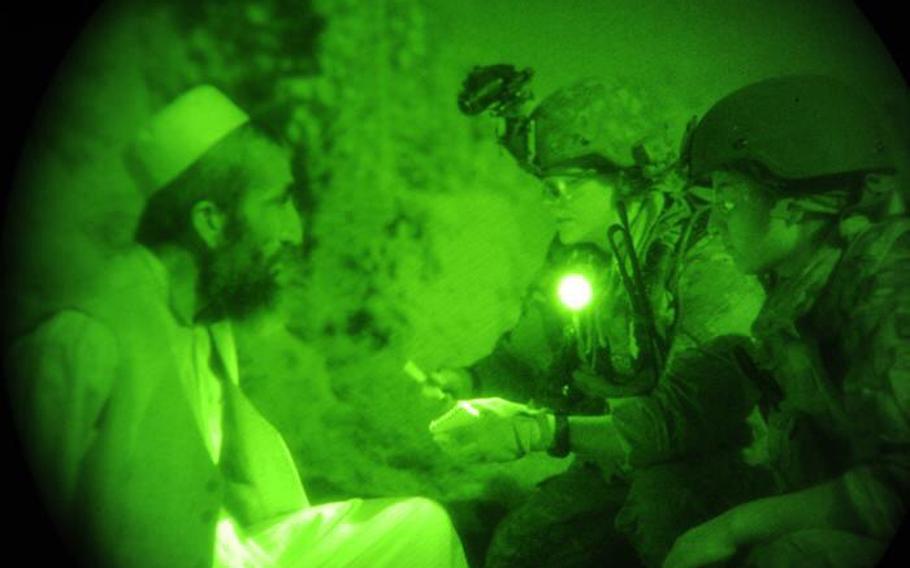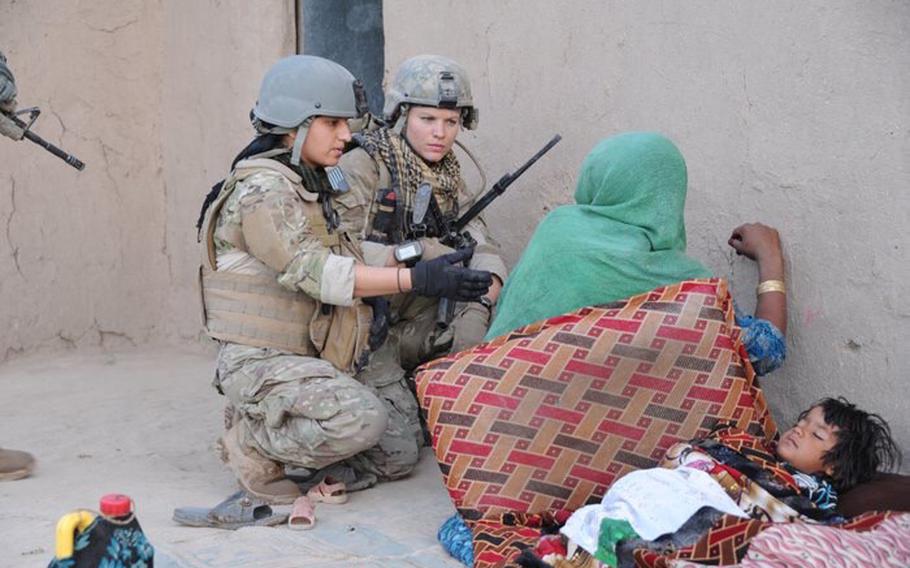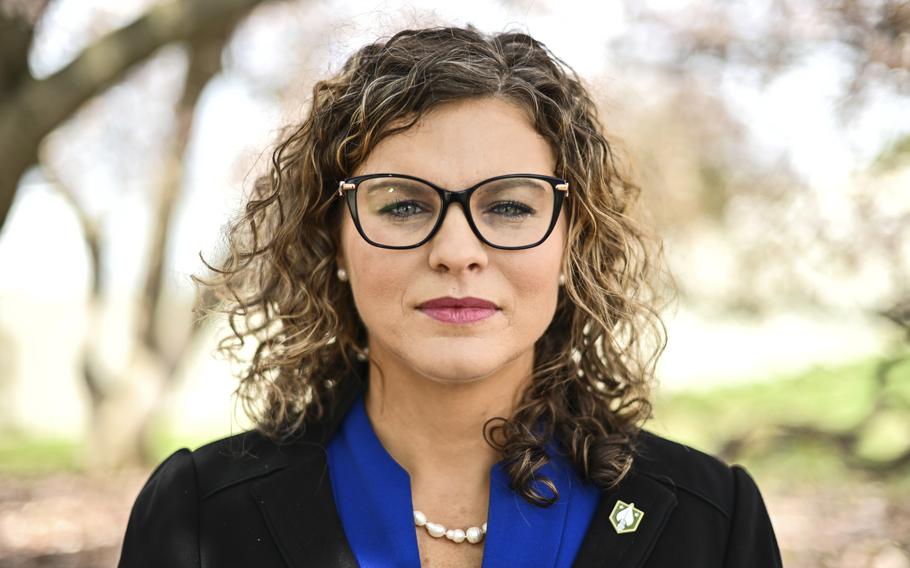
Jaclyn “Jax” Scott, left, Cassandra Knabenshue, center, and Meghan Malloy worked in the Army’s cultural support teams during the Afghanistan War. (Ricky Carioti/The Washington Post)
Years before U.S. military women were formally authorized to hold ground-combat jobs, Jaclyn "Jax" Scott was conducting nighttime raids with special operations personnel in northern Afghanistan.
They'd kick in doors, Scott said, and she'd enter Afghans' homes directly behind the breachers, identify any women and children, and marshal them to a safe space for questioning. In Afghanistan's conservative culture, her presence was intended to be a message of good faith to villagers frightened by the sight of armed American troops.
Male colleagues seldom saw it that way, Scott said, recalling what she and other women assigned to these cultural support teams, or CSTs, said was routine hostility from the Army Rangers and Green Berets with whom they were partnered. "Before they would go on missions," she said, "they looked at us and they'd be like, 'I unfortunately have to take one of you, which means I have to get rid of a shooter.' And I'm like, 'We can shoot.'"
For many of these women, the reception back home felt equally discriminatory. In 2013, when Scott returned from consecutive deployments, she bore the scars of combat: a brain injury from concussive grenade blasts, and back, neck and shoulder ailments owed to heavy falls. When she sought treatment for post-traumatic stress, the Army doctor laughed at her, Scott said. He prescribed sleep aids for jet lag instead.
More than 300 women participated in the cultural support team program between 2009, when it was activated, and 2021, when the Afghanistan War ended. Many sustained life-changing injuries as a result of their work, only to find that they have had to prove to the federal government their need for specialized health care because the Pentagon never classified them as "combat" veterans.

Jaclyn “Jax” Scott, center, and an interpreter speak with a man in northern Afghanistan in 2012. (Department of Defense)
Last week a group of House Republicans and Democrats, all military veterans, introduced the Jax Act, which would require that these women’s personnel records be updated to reflect their front-line duties. The legislation, which was referred to the Armed Services and Veterans Affairs committees, is intended to remove the burden of proof Scott and others have faced when seeking medical treatment. Advocates, including the organization Special Operations Association of America, which brought the issue to the lawmakers’ attention, say it also would change the broader conversation surrounding female veterans and challenge persistent misconceptions about their service.
"This is about more than just amending a military record," said Rep. Darrell Issa (R-Calif.), an Army veteran and the bill's primary sponsor. "It's about telling the truth, recognizing courage under fire, and ultimately defending those who defended all of us."
With its bipartisan sponsorship, there’s a strong chance the measure will move forward.
It wasn't until 2016, during the Obama administration, when the Pentagon ended its prohibition on women serving in the infantry and direct-action Special Operations positions — leaving no jobs off-limits. Today, women make up about 2 percent of Army infantry and tank units. They hold about 10 percent of jobs in U.S. Special Operations Command, although few have taken positions in the most elite units.
Around that time, while battling extreme pain from a knee injury, Scott, the Jax Act's namesake, sought treatment at a Department of Veterans Affairs facility. She recalled her shock when, weeks later, she received a letter informing her that an investigation had found her ailments were not combat-related, a determination that affected her ability to receive medication and care.
Scott said she spiraled after that, battling alcohol abuse and becoming briefly homeless in 2018. It took an appeal to members of Congress to have her combat service acknowledged, and only then was she able to begin treatment for her traumatic brain injury and other afflictions. Now 39, the what-ifs haunt her.
"Maybe, if I had had that combat identifier the first time I walked in the door [at VA] … I wouldn't have gone homeless," said Scott, who continues to serve in the Army Reserve. "Maybe, [if the doctor] I talked to … when I came home, maybe if he didn't marginalize me, a lot of this wouldn't have happened."

Jaclyn “Jax” Scott, center, speaks with an Afghan woman in 2012. (Department of Defense)
Caitlin "Cat" Clason, a former Army officer, deployed in 2012 to southern Afghanistan, not long after another woman in the CST program, 1st Lt. Ashley White, was killed by an improvised explosive device.
Clason took a couple of hard hits to the head during the deployment, and she worries about the toxic fumes she was exposed to from the burn pits at Camp Bastion, a sprawling coalition base in southern Afghanistan's Helmand province. But her first experience seeking care was not encouraging.
She became pregnant about six weeks after returning from deployment and sought a referral for prenatal care at Womack Army Medical Center in North Carolina, only to be told the staff couldn't help her as she was about to leave the military. She could seek care at a VA medical facility, she says she was told, in 90 days. Not knowing whether she'd been exposed to any harmful chemicals that could put her pregnancy at risk, the prospect of delay scared her and she never pursued VA care.
"It sucks enough when you're dealing with civilians who don't know anything about the military and they reject your statement that, 'Hey, I actually served in combat,'" said Clason, now 39. "With the VA, that's supposed to be your community and your community of health care professionals, who are supposed to be subject matter experts on you, as a member of the patient population."
The Jax Act seeks to address this, too, mandating improved training for staff responsible for processing claims from women who served in cultural support teams. The experience inspired Clason to study health issues specific to female veterans: She's now a predoctoral student in the University of Pennsylvania's nursing program.

The Jax Act, named for Jaclyn “Jax” Scott, seeks to recognize the combat service of more than 300 women who served in the Army’s cultural support team program during the Afghanistan War. (Ricky Carioti/The Washington Post)
Cassandra Knabenshue, a Marine Corps veteran and former Army medic, was eager for the chance to see combat. But on her second mission in Afghanistan, in 2013, she had to jump 15 feet to the ground from a Chinook helicopter as it made a hard landing, sustaining trauma to her neck and knee. She finished the deployment, but shortly after returning home, while training for a subsequent mission, a parachute accident almost split her foot in half. The injury required specialized surgery.
When Knabenshue sought a disability rating in 2017 — the percentage-point scale used to determine benefits, access to care and ability to continue serving — for conditions stemming from her CST deployment, she learned how much the lack of combat documentation would cost her. She was rated 10 percent disabled for her neck injury, 20 percent for her anxiety caused by post traumatic stress but nothing for her damaged foot.
The low disability rating resulted in her being recommended for medical separation, rather than retirement, from the Army, three years shy of the tenure required to secure pension benefits.
Ultimately, to secure a medical retirement from the military, Knabenshue said, she had to retain an attorney and appear before a review board. The process took more than a year.
Knabenshue, 41, said that her husband, a Special Operations soldier, went through the medical review process at the same time she did. It was "like a cakewalk for him," she said. "His docs … wrote a letter with all of his injuries, they wrote up a summary, he went and had his exams. I mean, he just sailed through."
Rep. Chrissy Houlahan (D-Pa.), a former Air Force officer, said she was moved by the women's stories of inequity. With the Jax Act, Houlahan said, "we are hopefully telling a population of people who serve, and wear our uniform that they do matter, and that we do collectively care and value them."